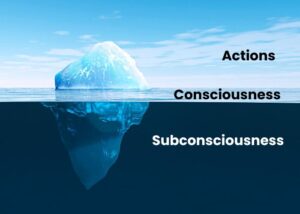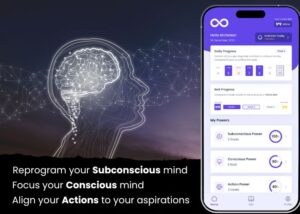All of us had days when our internal dialogue seemed to never cease. Even trying to sleep is difficult when you have been thinking about work problems or family issues for five hours straight. How can we stop these unwanted thoughts and reprogram our subconscious mind to achieve what we truly desire?
Imagine this situation: After a tiring day at the office you went to bed early, but unsolved issues with a co-worker and a friend kept you awake and overthinking your problems. You look at the clock, it’s 3 a.m. and you are sweating in your bed unable to sleep. Anxiety starts to creep, and you find yourself getting up to eat a snack and watch TV in an attempt to relax…
Before you realize you are in the fourth episode of a Sitcom that doesn’t even make you laugh and its already 5 a.m. You quickly dress up and go to work so exhausted and in such a bad mood that you are not able to meet your deadlines and mess even more your relationship with your co-workers.
A series of thoughts and emotions led you to an unwanted outcome. If this kind of situations become usal you might even start thinking that there isn’t a way out.
But don’t worry, you have the power to reprogram your subconscious mind thanks to Neuroplasticity, a scientifically proven concept defined as the brain’s ability to change its structure and function through persistent repetition of thoughts.
 To begin with, what is the Subconscious Mind?
To begin with, what is the Subconscious Mind?
The subconscious, often called the unconscious mind, has fascinated psychologists and neuroscientists for many years, in the XXI century was one of the main topics in scientific exploration. Recent studies are starting to shed light on this enigmatic part of the human psyche, revealing its profound influence on creativity, decision-making, and learning.
The subconscious is a storage of thoughts, feelings, memories, and automatic processes that work silently and “below” our conscious mind. Is a profound aspect of our mental landscape that influences various aspects of our lives.
In an interview with the New Scientist magazine, Emma Young said:
“Approximately 95% of our thoughts, feelings, and memories live in our subconscious. Including habits and patterns, automatic body function, creativity, emotions, personality, beliefs and values, cognitive biases, and long-term memory.”
Think of the professional pianists who can play a difficult Mozart piece without even looking at the partiture. They have memorized the notes so well and have internalized the technique so deep in their minds that they can play it without even thinking about it.
Behind this talent are are hours and hours of practice and good habits, they have trained their minds and bodies to exhaustion, to the point when all these techniques become Subconscious.
Your mind can either help or hinder you. By understanding its principles and using them to your advantage, by learning how to reprogram it, you can improve your quality of life and achieve your goals.
 The deep mind: The influence of Subconscious Beliefs in Our Lives
The deep mind: The influence of Subconscious Beliefs in Our Lives
Henry Ford once said, “Whether you think you can or think you can’t, you’re right.” It is our thoughts that create our reality.
Beliefs formed early in your life, shaped by experiences, interactions, and societal influences serve as a lens through which you perceive the world, significantly impacting your decisions, behaviors, and relationships.
Our upbringing has a major role in the formation of subconscious beliefs, individuals who have experienced a challenging environment or childhood bullying may harbor subconscious beliefs of inadequacy, resulting in self-sabotaging behaviors and a fear of failure. This can hinder them from achieving their goals due to low self-esteem and persistent intrusive thoughts that seems to come out of nowhere they struggle to manage. Conversely, those who have internalized empowering messages and received positive reinforcement growing up demonstrate confidence and resilience when faced with challenges, leading to success and self-realization.
Internalized positive beliefs can drive you forward, inspiring ambition, creativity, good habits and resilience. On the other hand, negative beliefs can create all kind of mental barriers, preventing you from realizing what you are truly capable of, making you think that you are not worthy, or that you are somehow less valuable than others.
But don’t worry, even if you had a difficult time when you were younger, or you have problems managing negative thoughts or emotions. You still have the power to achieve your goals, the change is up to you, with the methods that you will find in this article. You will be able to reinforce thoughts, emotions, and beliefs and access your subconscious mind. You will be able to reprogram it and align your entire being with your goals and desires.
 Iceberg Psychology
Iceberg Psychology
Many personal characteristics influence what we do: skills, knowledge, social role, self-image, traits, and motives. These various characteristics exist at different levels of consciousness. You can think of these characteristics as being levels of an iceberg. The most conscious ones are those above water on the visible tip of the iceberg, while the characteristics that are less conscious or unconscious are below water, on the submerged part of the iceberg.
Freud’s iceberg theory metaphorically represents the mind’s three levels: the conscious (visible tip of the iceberg), the preconscious (just below the surface), and the unconscious or subconscious (vast submerged portion).
He wrote: “The mind is like an iceberg, it floats with one-seventh of its bulk above water.”
While we’re aware of the conscious, the preconscious contains easily accessible memories, and the subconscious houses deep-seated desires and memories, influencing behavior despite being largely inaccessible unless we know the correct practices.
 5 ways to tap into your subconscious and reprogram it.
5 ways to tap into your subconscious and reprogram it.
Your subconscious mind does not distinguish between what is real and what is not, and will accept any pattern or idea that you repeatedly present to it and then reflect it in your life. You are an expert in programming your mind, you have done it all your life in the form of experiences that marked you, or phrases that repeated to you or thoughts that you repeated yourself constantly.
Unfortunately, until now, you have probably programmed your mind reinforcing negative thoughts and limiting beliefs or you have not considered important to include or reinforce those constructive and empowering beliefs that align with your goals.
As we said before, you have the power to reprogram yourself to achieve a totally different mindset thanks to Neuroplasticity, an incredible brain function, studied for more than 40 years, that allows our brain to change its structure, function, neuronal circuits and even create new neurons through a process called neurogenesis.
The most popular and effective ways to reprogram the subconscious mind are:
1. Autosuggestion through affirmations
Simple yet potent statements that, when repeated consistently, can reprogram the subconscious mind, foster positivity, and catalyze transformative change.
With a precedent in Hinduist and Buddhist mantras, rooted in the principles of cognitive psychology and positive thinking, affirmations serve as one of the most powerful tools for autosuggestion.
Affirmations must be positive and in the present moment, in the first person. This will help you too feel better about yourself and also reach the mind on the subconscious level.
You can put some background music or even binaural beats when listening to them.
Here are some examples:
-
I am successful.
-
I am allowed to ask for what I want and what I need.
Affirmations can also be in the form of Gratitude:
-
I am grateful for my life’s challenges for helping me grow and become who I am.
-
I am grateful for my dreams, and I know I have the power to manifest them.
Affirmations activate the brain’s reward system, releasing dopamine—the neurotransmitter associated with pleasure and motivation, making it easier to adopt new perspectives and habits.
2. Visualization
We usually daydream during the day and use passively our imagination; we think and all type of scenarios that involve people that we know or love we imagine our desires, dreams, and also fears. But since we are not totally conscious of this process, we don’t take advantage of it.
Active visualization involves mentally picturing desired aspects of your life, both within and beyond your current reality. You have to concentrate on achieving these desires and envisage the outcomes of their attainment. Instead of just letting your mind drift and divagate, you control it and focus it on your goals.
3. Binaural Beats
The perceptual phenomenon of binaural beats was discovered by Heinrich Wilhelm Dove in 1841. Is a perceptual auditory illusion created when two pure tones of slightly different frequencies are presented to each ear. It can be used for a huge variety of purposes, such as anxiety relief, relaxation, better quality of sleep, concentration, etc. You can even use Binaural Beats as a background sound during your daily activities, meditation, or when you are listening to affirmations, audiobooks or podcasts.
Research investigating binaural beats has found positive effects on pain alleviation, anxiety reduction, and memory.
For example, a meta-analysis that included 22 studies on the effect of binaural beats on memory, attention, anxiety, and pain relief found across all studies a statistically significant and consistent effect.
4. Meditation
Meditation encompasses a variety of techniques aimed at promoting heightened awareness and focused attention, being mindfullness, zen and vipassana some of the most popular. It is recognized as a method for altering consciousness and has demonstrated numerous psychological benefits on well-being.
5. Habit Tracking
In his book “The Principles of Psychology,” the influential philosopher and psychologist William James coined the term “bundles of habits” to describe living creatures, emphasizing how habits simplify actions required to achieve specific outcomes. He observed that habits enhance the precision and reduce the effort needed for our actions.
Habit tracking keeps in check instances of desired behavior, such as healthy eating, journaling, or reading, as a means to reinforce these habits.
Research indicates that tracking behavior can boost the likelihood of habit formation, as establishing healthy habits streamlines the process of consistently making positive choices.
 Mental Power. An holistic tool to reprogram your subconscious mind to achieve success and self-realization.
Mental Power. An holistic tool to reprogram your subconscious mind to achieve success and self-realization.
To make your thoughts work for you and not against you, to control and align them with your desires, you must tap deep into the recesses of your brain, uncovering the hidden roots that govern our consciousness: the subconscious.
Covering all the principal methods, from visualization to habit tracking, in an innovative all-encompassing way, Mental Power app will allow you to tap into those deep layers of the mind, that would otherwise be inaccessible.
Our app gathers information about the mind from recognized sources and applies it effectively, with its various functionalities stimulates the powers that define the human being: Subconscious, Conscious, and Action.
Each Power can be used independently, but when acting synergistically the difference in results is notorious, similarly, all of the previous 5 ways to tap into your subconscious can be worked separately, but with Mental Power app you will find them included in the three main Powers.
The Subconscious Power allows you to plant in your subconscious everything you want to be part of your reality. In your Subconscious objectives you can include the affirmations that you want to incorporate into your life and with the repetition of these affirmations you will mold your mind, generating and reinforcing new neuronal connections that will serve as support for your new and better thoughts.
With the Conscious Power, you will be able to take care during the rest of the day of the seed that you planted with the reproduction of the Subconscious objective, focusing your attention and concentration, blocking your negative thoughts, and improving your perception in every situation.
The Power of Action will finally help you to translate your thoughts into actions, incorporating better habits and achieving short, medium, and long-term goals to start creating your reality.
Simply and practically, you will experience the satisfaction of reprogramming your subconscious mind by aligning it with your true desires. You will change your thoughts and create your reality exactly as you had thought.
Start today and embrace the amazing journey of self-discovery and transformation. Unleash the power of your subconscious mind, and sculpt the reality you desire.
Whatever we plant in our subconscious mind and nourish with repetition and emotion will one day become a reality.
Earl Nightingale




